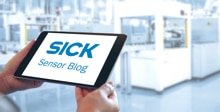On the Internet, customers can create their dream car in a matter of moments. The options are endless: which model? Which color? Equipment? Engine? Petrol or diesel? You can customize almost every detail. However, this has an immense impact on the production concept. All the necessary components have to be ready for the production line so that the customer's dream car is ready as soon as possible. The real challenge here is making sure that exactly the right components are available at exactly the right time. Thanks to the RFID solutions by SICK, all this is possible. 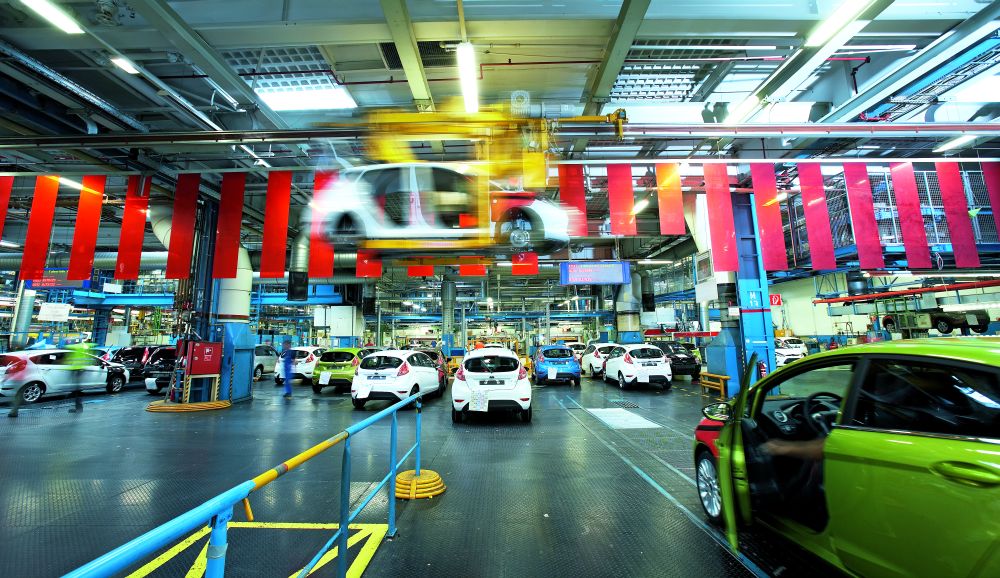 One of the key principles of lean production is Eliminating waste, reducing inventory. Unfortunately, this goes against everything needed for a flexible, made-to-order production line. However, production factors such as operating equipment and materials can still be used in an economic and efficient manner if the production concept is flexible enough to react. Mass-scale production is now a thing of the past. Nowadays, products are made-to-order. As such, there is always the risk that the equipment selected for a particular car will not be available for the point in production when it is required. Now, using the right combination of automatic identification technology solutions, companies can know exactly where a component is at all times. As a result, production downtime is cut to a minimum. The higher the degree of customization in a vehicle, the more information the automobile manufacturer must collect, process and evaluate during production. Every stage of the vehicle assembly process has to be monitored and documented using the same form of technology, leaving no margin for error. And until very recently, the need to ensure continuity and traceability across all stages posed a real difficulty for vehicle manufacturers and their sensor suppliers.
One of the key principles of lean production is Eliminating waste, reducing inventory. Unfortunately, this goes against everything needed for a flexible, made-to-order production line. However, production factors such as operating equipment and materials can still be used in an economic and efficient manner if the production concept is flexible enough to react. Mass-scale production is now a thing of the past. Nowadays, products are made-to-order. As such, there is always the risk that the equipment selected for a particular car will not be available for the point in production when it is required. Now, using the right combination of automatic identification technology solutions, companies can know exactly where a component is at all times. As a result, production downtime is cut to a minimum. The higher the degree of customization in a vehicle, the more information the automobile manufacturer must collect, process and evaluate during production. Every stage of the vehicle assembly process has to be monitored and documented using the same form of technology, leaving no margin for error. And until very recently, the need to ensure continuity and traceability across all stages posed a real difficulty for vehicle manufacturers and their sensor suppliers.
Clear body identification using RFID technology
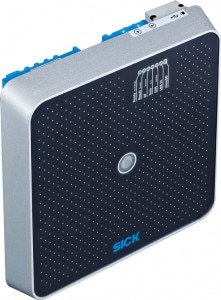
- RFID-Interrogator RFU630
Once a body has been painted, bar codes and Data Matrix codes become invisible, while individual punched plates and active RFID tags are too expensive for consistent use. Furthermore, identification labels attached to assembly carriers are not a safe enough solution. Vehicles move between different assembly carriers several times throughout the construction process, meaning that this solution could result in a great deal of confusion. To solve this problem, the car body must be clearly labeled at the start of the production process using a solution that remains visible throughout every stage in the production process - even in the paint shop where temperatures can reach up to 220 °C. In a bid to solve the issue, SICK took the requirements and used them to adapt RFID technology. The result? The RFU630 read/write device using UHF technology (UHF = ultra high frequency). Its read/write attributes have been perfectly adapted to the applications used in the automotive industry. Specially designed for easy integration, the RFU630 meets all the requirements set out for vehicle production processes. The transponder is a stable RFID label which is resistant to extreme temperatures, but still cost-effective. Attached to the body's lower platform, the reliable label accompanies the vehicle right from the start of the production process. The body-ID also manages to survive the paint process unharmed, making mix-ups almost impossible.
Mercedes-Benz uses reliable body identification technology that can withstand its hot and metalwork-heavy processes
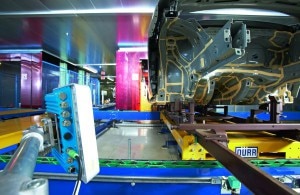 UHF-RFID devices for wireless identification of car bodies
UHF-RFID devices for wireless identification of car bodies
The Mercedes-Benz plant in Rastatt, Germany, manages its tagged vehicles using UHF-RFID devices at a number of different work and treatment stations, all the way up to final assembly. After pretreatment by degreasing, rinsing, and phosphating in huge spray systems and following the cathodic dip painting process, the car bodies are dried in an oven at approximately 180 °C. This would put stress on most RFID systems because the high-frequency reflections from the system can impair data transmission between the transponders and the read/write devices. However, the RFID systems offered by SICK are able to withstand all hot and metalwork-heavy production processes. With approximately 350,000 readings per day in the system, reading accuracy is a must, since erroneous readings can lead to car bodies being misdirected or mixed up. There is even the risk of collision. SICK's RFID solutions offer a reading accuracy of 99.98%.
Ford is currently putting the advantages of RFID to the test in its material handling systems
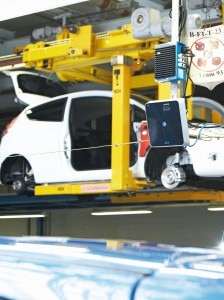 RFU63x interrogator (read/write unit)
RFU63x interrogator (read/write unit)
Ford is currently running a pilot material management project at its production plant in Saarlouis, where it is testing an electrical overhead conveyor for engine components. The plant currently produces around 1,600 vehicles a day. Using SICK's RFID technology, Ford has been able to document all stages of it production process, from the construction of the car body to the delivery of the finished product to the customer. In future, this could be extended to include repair processes, special applications, and the management of loading processes. According to Dr. Klaus Schmitz, the project manager at Ford, ensuring an extremely high level of flexibility across all production and logistics processes would give Ford a real advantage over its competitors.
No time to look and too expensive to wait. Where is the finished car?
 Until the completed cars are ready to be picked up and transported to the dealerships, they are left parked in large parking lots. The problem occurs when it comes to finding a car that has to be transported. If a car has been parked in the wrong area by accident, it may take the company hours to locate it again. And when you're producing over 1,000 cars every day, it can be quite easy to lose track. Every single car is made-toorder. Every car is different to the next. However, when information is stored on an RFID tag, the customer's dream car is located quickly and can be loaded up for transport in no time.
Until the completed cars are ready to be picked up and transported to the dealerships, they are left parked in large parking lots. The problem occurs when it comes to finding a car that has to be transported. If a car has been parked in the wrong area by accident, it may take the company hours to locate it again. And when you're producing over 1,000 cars every day, it can be quite easy to lose track. Every single car is made-toorder. Every car is different to the next. However, when information is stored on an RFID tag, the customer's dream car is located quickly and can be loaded up for transport in no time.
Reducing the impact of recall campaigns: when was the car built?
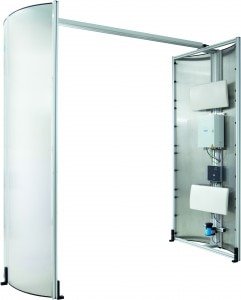 Track-and-trace-System RFGS Pro
Track-and-trace-System RFGS Pro
Traceability helps companies to avoid costly recall campaigns and limit the extent of damage. For example, if a faulty component is found in a car, the company has to find out which individual parts were used to assemble the final product. And more importantly, it has to find out how many other cars are equipped with the faulty component and which cars are affected. In order to ensure complete transparency in vehicle parts, vehicle manufacturers are planning to document every single component in every single vehicle in future. To achieve this, they will mark all important components with transponders which are captured in their assembled state during the production process. SICK has created suitable RFID gates for this purpose and also offers customers its extensive expertise in commissioning and improving reading points. Likewise, it also provides the manufacturers' suppliers with RFID technology at component level.
Tracking components every step of the way
The high-resolution identification technology enables vehicle manufacturers to trace every individual step so that they always know which models are affected and what type of numbers are involved. In the event of a recall campaign, for instance, they can identify all cars that contain the component that needs to be repaired or replaced.
- Productportfolio: RFID, RFGS Pro, RFU63x
- Cutomer information: Mercedes-Benz, Ford
